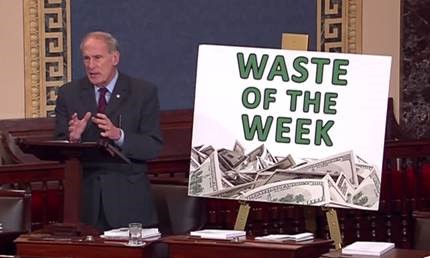WASHINGTON, DC – Senator Dan Coats (R-Ind.), chairman of the Joint Economic Committee, today delivered his 50th Waste of the Week speech and highlighted $85.5 billion in improper Medicaid payments paid out from 2014-2016.
To watch Coats’ speech, click here or on the image above.
According to the Department of Health and Human Services (HHS), Medicaid’s improper payment rate averaged almost 10% annually over the past three years. In 2015, Medicaid had the second highest improper payment rate in the entire federal government. Earlier this month, HHS put out an “alert” that Medicaid’s improper payment rate for 2016 is expected to jump to 11.5%.
Coats said that even though Medicaid has routinely been identified as a “high risk” for potential waste, problems with improper payments are only getting worse.
“While these $85.5 billion in improper payments were made, Medicaid enrollment continued to expand as a result of Obamacare,” said Coats. “This means more and more Americans are relying on an increasingly flawed system. So we have to ask the question: why do these improper payments keep taking place?”
Coats said persistent problems lie within HHS’ data systems for identifying and validating Medicaid and Medicare providers, which HHS directs states to use to help ensure that those Medicaid providers receiving payments are actually eligible. Bureaucratic mismanagement has enabled providers to obtain Medicaid payments when they are not even medically licensed in a state or when they don’t even practice in the United States.
The Government Accountability Office (GAO) recently examined the addresses listed by some of these providers as their primary place of practice and found that many were fake. One provider within the HHS database listed a demolished building as its official address and another listed the address of a fast food restaurant.
“HHS’s poor oversight makes it easy for criminals to gain access to Medicaid and harm patients,” said Coats. “HHS absolutely must use the tools it already has at its disposal to prevent these improper payments, such as verifying the location of physician offices and making sure providers are licensed. My colleagues and I also must remain vigilant and ensure HHS is fully utilizing its resources to crack down on improper payments and bad actors within Medicaid.”






